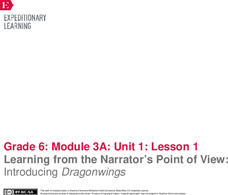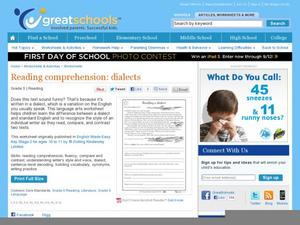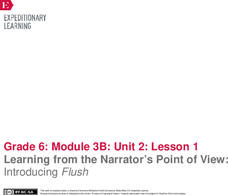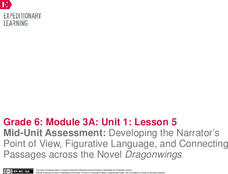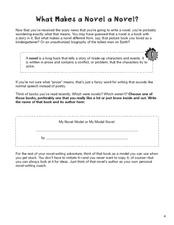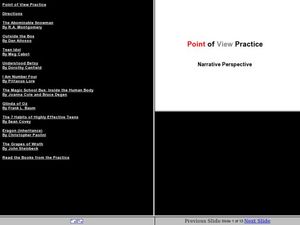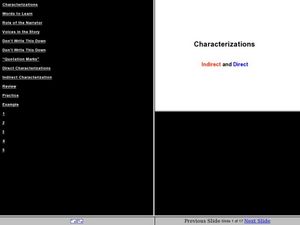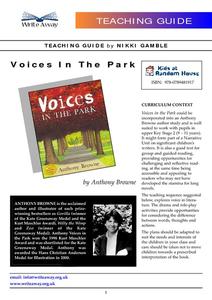National Endowment for the Humanities
Edgar Allan Poe, Ambrose Bierce, and the Unreliable Narrator
Stories by Edgar Allan Poe and Ambrose Bierce provide readers with an opportunity to investigate unreliable narrators. The lesson plan begins with an activity about different types of point of view and continues as scholars apply their...
K12 Reader
Narrator’s Point of View Flow Chart
How can you tell what point of view a narrator is using, and why does it matter when reading or writing? Use a handy flow chart to determine whether or not your narrator is telling the story from a first or third person point of view.
EngageNY
Learning from the Narrator’s Point of View: Introducing Dragonwings
Journey into the past with Laurence Yep's Dragonwings. Scholars complete anchor charts to analyze techniques the author uses to develop the narrator's point of view in his novel. As they read, pupils also complete word catchers to track...
Curated OER
Reading a Dialect
Reading a dialect can be difficult; show readers that it can also reveal fascinating details! They read two extracts from Jane Gardam's The Hollow Land, which is written in a British dialect. Readers answer comprehension questions,...
EngageNY
Learning from the Narrator’s Point of View: Introducing Flush
It is all down the drain. Scholars read chapter one of Flush and write any unfamiliar words in their word catchers and identify the narrator and point of view of the story. Pupils complete a point of view anchor chart and use Thought,...
Curated OER
Express Yourself Lesson Seed 8: Character
Characters often change over the course of a story or novel. Use the sample graphic organizer provided here to track how the narrator has responded to the sequence of events in chapter four through six of The Cay. In addition to this...
EngageNY
Mid-Unit Assessment: Developing the Narrator’s Point of View, Figurative Language, and Connecting Passages across the Novel Dragonwings
Let's get creative! As part of a mid-unit assessment, scholars create a piece of artwork illustrating the theme from Laurence Yep's novel, Dragonwings. Additionally, pupils use a graphic organizer to identify figurative language in the...
Curated OER
Experience and Perspective
Sixth graders make connections between past experiences and perspective. They read Keeping the Night Watch by Hope Anita Smith. Then, they analyze a character's history and state the past experiences that form their perspective. In the...
Curated OER
What Makes a Novel a Novel?
As your authors prepare to write a hypothetical novel, they need all the inspiration they can find! Using a book they have already read (and enjoyed), learners complete a literary analysis by filling in eight short-answer questions....
Curated OER
Summer of the Monkeys
While reading the book Summer of the Monkeys by Wilson Rawls, the class ties together the core reading objectives, which are making predictions, comprehending new information, reading for author's purpose, independence in reading, and...
Curated OER
Fifteen Seconds of Fame
A reading of Panic in Paris launches a review of the elements of narrative writing. Class members work in groups to find narrative devices in the book and record their findings on a provided worksheet. Using the completed pages, emergent...
Curated OER
Historical Agency in History Book Sets (HBS)
Study historical events by combining the study of historical fiction and non-fiction. Learners read about true past events in historical fiction novels and then research non-fiction accounts of the same events. What are some differences...
Curated OER
Interpreting Perspective
Work on characterization with a narrative writing lesson plan, in which middle schoolers interpret a character's perspective. They discuss family traditions and examine how culture can influence a character's perspective. Next, they read...
Curated OER
Comparing Poems
Young literary analysts compare two poems by the same author. Readers look for slant rhyme, observe the beat and rhythm of each, and search for repeated vowel sounds. After re-reading, they observe the lack of punctuation and the stanza...
Curated OER
Point of View Practice: Narrative Perspective
Excerpts from ten texts (There's something for everyone from Steinbeck's Grapes of Wrath to Covey's Seven Habits of Highly Effective Teens, and more!) provide the springboard for an examination of point of view. For each short excerpt,...
Curated OER
Multiple Perspectives
Analyze multiple perspectives in short stories. Sixth graders examine the point of view of each major character in three different short stories. After reading the stories, they role-play characters and hypothesize about the character's...
Curated OER
Finding Problems In A Story
Students categorize information into a problem/solving chart and examine the value of using a diary. In this problem solving and diary instructional activity, students read portions of Dear Mr. Henshaw, while they investigate the...
Curated OER
Characterizations: Indirect and Direct
Connect literature to narrative writing by researching descriptive writing techniques. Elementary and middle schoolers identify the importance of a narrator and voice in the storytelling process. They read writing samples and identify...
Write Away!
Voices In the Park
Explore the impact a narrator's point of view has on a story with a reading of the children's book, Voices in the Park by Anthony Browne. Written in four different voices, the story is told and retold from different perspectives to...
Reed Novel Studies
The Little Prince: Novel Study
Do our eyes play tricks on us? The Little Prince narrator begins with a discussion of the difference in what grown-ups and children see. Scholars read how he puts this to the test using a drawing and find synonyms to vocabulary words,...
Manchester College
What’s Your Point of View?
Work on deciphering the point of view of various pieces of literature. As readers review the concepts of first, second, and third person perspective, they apply what they know to different passages.
MENSA Education & Research Foundation
Magical Musical Tour: Using Lyrics to Teach Literary Elements
Language arts learners don't need a lecture about poetry; they listen to poetry every day on the radio! Apply skills from literary analysis to famous songs and beautiful lyrics with a instructional activity about literary devices. As...
K12 Reader
Character Development in "The Tell-Tale Heart"
Yes. Make up your mind to use this reading comprehension resource with your readers. You need not be nervous, not even a little nervous. An answer sheet is provided.
Penguin Books
A Teacher's Guide to the Signet Classic Edition of Edith Wharton's Ethan Frome
Is it possible to have too much concern for others? Can we be trapped by our expectations as well as those of society? Edith Wharton's chilling tale of Ethan Frome asks these and other disquieting questions. Signet's guide to Ethan Frome...
Other popular searches
- Point of View Narrator
- Author and Narrator
- Unreliable Narrator
- First Person Narrator
- Identify Narrator
- Identifying the Narrator
- Point of View/narrator
- Omniscient Narrator
- Identify Narrator or Speaker
- Narrators Point of View
- Narrator Mask
- Narrator and Voice




